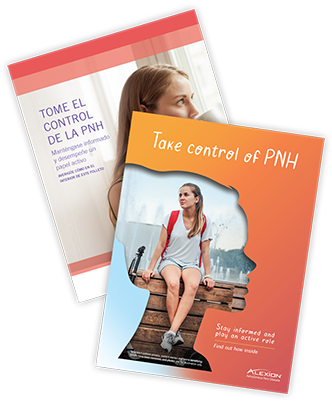Take an active role in managing your PNH
PNH can be unpredictable, but you can feel more in control by taking an active role in managing your disease. Here are some ways you can take charge of your care.
Talk to your doctor
Be honest with your doctor about symptoms and concerns. Download our Doctor Discussion guide to help prepare for your next appointment. It includes suggested questions to ask, disease management goals, and details for connecting with OneSource™, our personalized support program.


Continue learning
Get easy-to-understand and comprehensive information about PNH, tips for disease management, and ways to take more control of your PNH. Download: Take Control of PNH brochure Descarga aqui el folleto Tomar El Control De La PNH
Keep track to stay on track
You may not notice the minor changes in your symptoms from day to day. But keeping a record of
symptoms and lab results will help you and your doctor be aware of changes in your health over time.



